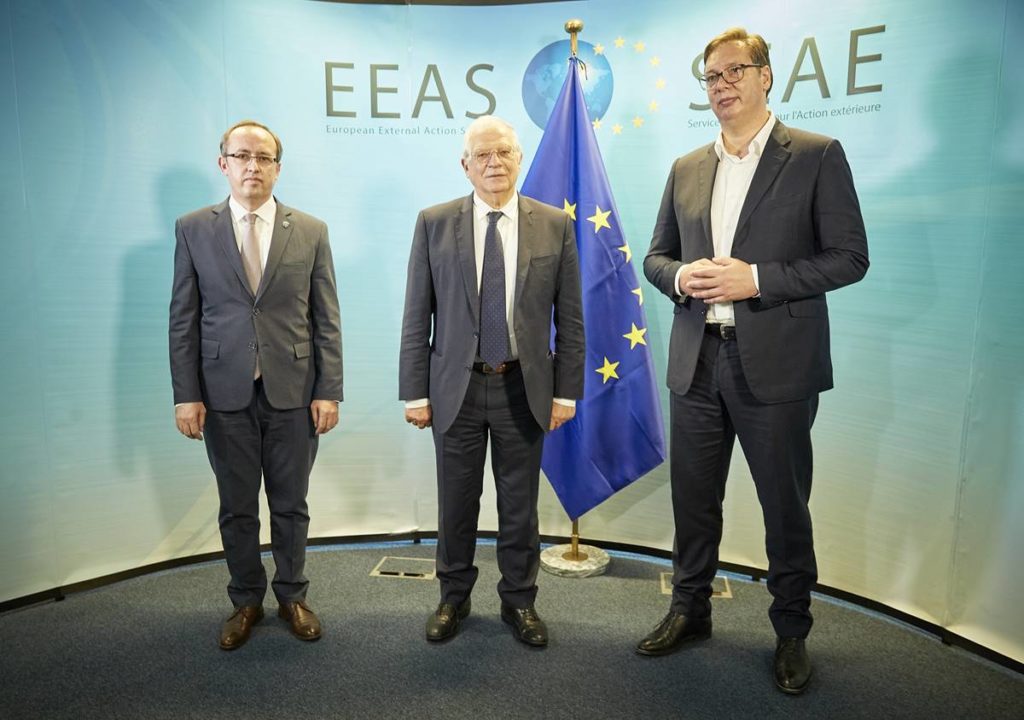European Commission President Ursula von der Leyen started today her trip to the Western Balkans countries, ahead of the EU-Western Balkans Summit on 6 October, amid a sudden escalation in tension between two of the countries.
The tension erupted last week in northern Kosovo and along the Kosovo-Serbia border because of a dispute between the two countries on which licence plates Serbian vehicles entering Kosovo should use. The Serbian population in the area protested against a decision by Pristina that drivers from Serbia must now use temporary plates valid for 60 days in the neighbouring country.
The protests have escalated and led to mutual accusations and the deployment of police and army forces on both sides of the border.
EU High Representative High Borrell is doing his utmost to defuse the situation and is engaged in diplomatic outreach to both sides. Yesterday, he issued a statement telling Serbia and Kosovo that they "need to unconditionally de-escalate the situation on the ground, by immediately withdrawing special police units and dismantling of roadblocks”.
“The EU-facilitated Dialogue continues to be the only platform to address and resolve all open issues between the Parties, including those related to freedom of movement and licence plates, and I strongly urge Kosovo and Serbia to use it.”
The dialogue started already in 2011 and was resumed in September 2020 after a stand-still during almost two years. Peter Stano, lead spokesperson for EU external affairs, explained then that EU is not to be blamed for this. “We are always ready to facilitate the dialogue when the two main parties are ready.”
Has the dialogue failed?
Asked at today’s press conference in Brussels (27 September) about the origin of the tension between Kosovo and Serbia despite the ongoing dialogue, Peter Stano replied that, “The dialogue has not failed - the failure is on both sides in the dialogue.”
EU is only facilitating the dialogue aiming at reaching a compromise and a legally binding normalisation of the relations between the two countries, he explained. Instead of carrying out unilateral measures and provocations, they should use the platform which the EU is offering to solve their divergencies.
A meeting with the Chief Negotiators is scheduled in Brussels in the coming days and would be seen as a first positive step to discuss the way forward. The hope in EU is that the meeting will take place.
Dr Thomas Bickl, a researcher of bilateral conflict and dispute resolution in the Western Balkans, does not share EU’s optimism and thinks that it must engage in active mediation to make progress in the dialogue.
"The EU-sponsored Serbia-Kosovo dialogue has regrettably been a toothless tiger right from the beginning,” he told The Brussels Times. “Just having the parties sit down together at regular intervals, but with no real agenda and without any structured input does not work. All conflict resolution experience has shown that you need active mediation including contents input and deadlines from a third party to be able to strike a deal.”
An EU special representative, skilled and knowledgeable as he or she may be, is not enough, if they have no mandate for providing good offices, expertise, and making proposals, according to Bickl.
“Of course, there never is a guarantee to arrive at a bilateral settlement but to count solely on the political and good will of the conflicting parties is a waste of time and doing the EU's diplomacy reputation a considerable disservice."
A conflict between two countries in Western Balkans, despite their perspective of joining the EU, can only damage their chances and delay the accession process. EU is only admitting countries that are recognised states and have solved their bilateral issues with neighbouring countries.
M. Apelblat
The Brussels Times

